My Hero Academia is, without a single doubt, one of the most successful anime franchises here in the West. The show instantly found an audience thanks to its strong writing, insanely likable characters (like Ashido and Kaminari, the best characters in the show don’t @ me), and honest, gut-wrenching emotion.
Oh, and all the awesome superpowers and fights. Those are good, too.
With all of that behind it, there was bound be a video game adaptation. A 3D fighting game in the vein of One Piece: Burning Blood or Naruto: Ultimate Ninja Storm seemed to be a slam-dunk affair. Unfortunately, although the game itself is fun, My Hero One’s Justice takes too many liberties with the source material to be truly successful.
Gameplay
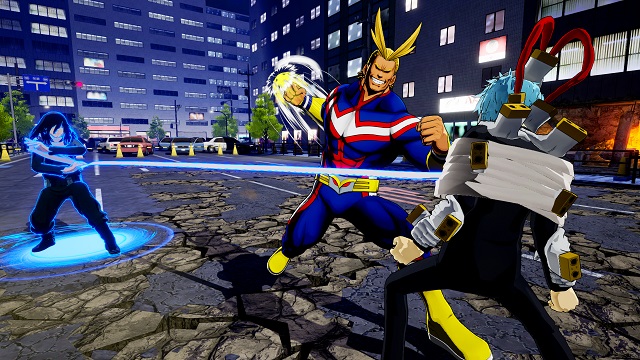
When you boot up the game for the first time, you’ll find a variety of different single and multiplayer modes to explore — a story mode that pretty much takes you through most of the show’s second and third seasons, a mission mode where you pick characters and run them through a gauntlet of missions during which your health doesn’t regenerate, both online and local multiplayer, and a classic arcade mode that was added in a day-one patch.
There is a fair amount of content to sink your teeth into, whether you’re a fan of the show or just a fan of fighting games. If you’re one of those folks who needs a game to give you at least 50 hours of gameplay in order for it to be worth a buy, you won’t be disappointed.
The gameplay itself is actually fairly simple, and will be familiar to anyone who has played Naruto: Ultimate Ninja Storm, or Pokken Tournament.
You have one button that will launch you into a normal melee combo and two buttons for “quirk attacks” that take advantage of your character’s abilities — for example, Midoriya’s Delaware Smash or Momo’s Creation. There aren’t any complex inputs here, and the key to stringing long combos together in My Hero One’s Justice is figuring out which quirk attacks chain into others and then linking them together by dashing toward your opponent.
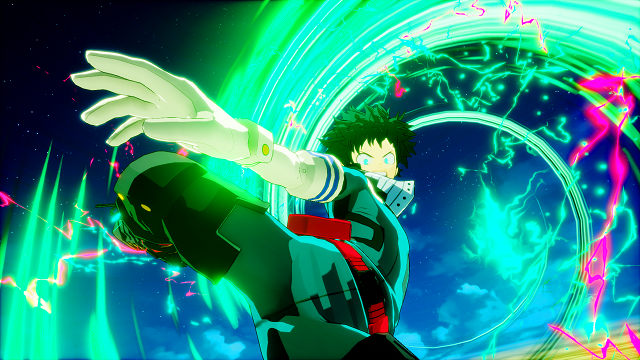
The set dressing is perfect, too. The characters look just like they do in the show — the jump to 3D is natural and doesn’t in the least venture into uncanny valley territory.
Buildings crumble as you run into them, which is a bit silly, but it adds to the feeling that your blows carry weight, while visual effects and camera shifts make heavy hits feel impactful, especially when you knock your opponent so hard they fly right into a wall and launch an intense, gravity-defying combo. It feels great.
This makes battles feel a bit like they do in Dragonball FighterZ, a game that has become the gold standard for the anime fighter genre. Unfortunately, My Hero One’s Justice falls short of that bar by a fair amount when you dig a little deeper.
Lost In Translation
Not everything is pitch-perfect, though.
One of the first problems you’ll encounter in the English release of the game is that there are no subtitles. This could easily be patched in later, but at first blush, it’s jarring. Sure, it might not seem like an issue since this is a fighting game at heart and the story mode pretty much follows the arc of the show exactly — but this lack of accessibility feels like an oversight.
Making matters worse, certain elements of the game aren’t easy to understand because they aren’t in English.
For example, loading screens. Here, the game will brag about how you can customize your character by equipping custom mottoes that change based on who you’re fighting. This is a great feature, especially for a game that’s based on a show that, at heart, is about the relationships between the characters and how they change over time. Unfortunately, if you don’t know Japanese, you’ll miss out on all of that.
Again, this wouldn’t be an issue if the game were captioned, or if there was an option for dubbed voices, but as it stands now, it feels like a whole section of the game is walled off for folks who aren’t bilingual.
Roll Call
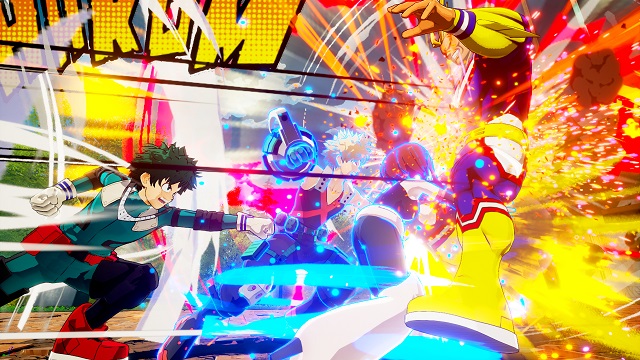
The roster for My Hero One’s Justice is respectable, even if the developers at Bandai Namco committed the ultimate sin in excluding Mina Ashido, the best character in the show.
Bandai Namco really did a good job balancing the need for lead characters (Iida, Uraraka, Shigaraki) while also adding some more minor fan favorites (Kaminari, Jiro, Asui, Toga). It speaks to their knowledge of their audience, and it’s very much appreciated.
It’s also good to know that they also plan to expand the roster through DLC — Shoot Style Midoriya, Endeavor, and Inasa Yoarashi have already been confirmed, and one can only assume there’ll be even more to come. I just hope they add Ashido (and Best Jeanist) down the line.
And despite what I said about the mottoes, there is a whole lot of fun to be had with the game’s customization features. I spent hours unlocking and accessorizing my favorite characters in completely ridiculous ways, then editing together a splash screen so that whenever I fight someone online, Denki Kaminari poses while the words “PERFECT BOY” flash behind him.
That alone could be good enough to justify the game’s purchase for some.
Quirkless
So all that sounds good, right? You’re probably wondering why I gave this game a 7 and compared it so unfavorably to Dragonball FighterZ, and that’s a fair question to have. Because yes, the game plays well! The roster isn’t balanced, but no fighting game roster is.
The biggest issue that the game has is that My Hero One’s Justice just doesn’t feel like My Hero Academia, no matter how much it may look like it.
For example, regardless of a character’s actual abilities, everyone gets two jumps and an air dash — which aren’t visually tied to the character’s quirks in any way. Having movement options that don’t feel character specific really flattens the game and makes the characters feel generic. Uraraka can fight in the air very well, sure, but she can’t really hover. Asui can’t climb up walls. Bakugo doesn’t have any explosion-based movement.
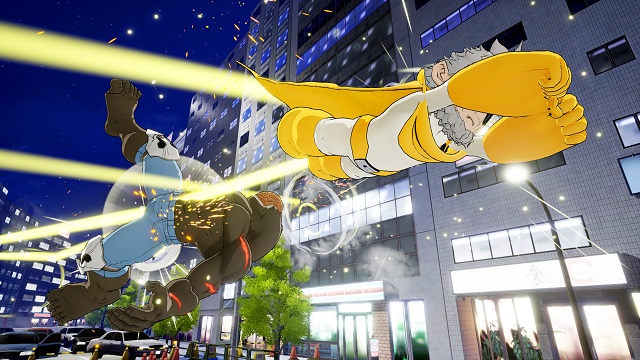
This problem extends to the characters’ fighting moves, too; characters don’t fight in the unique and creative ways that they do in the show. Stain’s Bloodcurdle quirk is completely absent — he’s just a generic swordfighter. Eraserhead only has one move that revolves around sealing his opponent’s quirks. Momo only creates very limited items, and most of her combos just revolve around her smacking fools with a spear.
A big part of My Hero Academia’s draw is that all the quirks feel so unique, and the show spotlights how all of the heroes and villains use their specific abilities to find creative solutions to big problems. My Hero One’s Justice’s true unforgivable sin is that this key element of the show didn’t cross over.
You’ll end up playing each character more or less the same way, using a projectile move to close the distance, chaining that into a combo, and finishing off with a flashy super move if you’re lucky. All the flash in the world can’t make up for the fact that the spirit of the show is lost when all the characters largely feel similar.
It might be too much to ask to have Asui surprise other players by climbing up walls, where Momo can set traps for opponents, or where Bakugo can have acrobatic explosion-based dodges, but these are all key elements of the show. It’s really a shame, because a My Hero Academia fighting game seemed like a no-brainer, and everything else about the game is pretty much spot on. But for now, this game just feels generic.
Fun, yes, but generic.
And maybe that’s enough for you! If you’re a fan of 3D fighters like Pokken Tournament and Naruto Ultimate Ninja Storm, My Hero One’s Justice will admirably scratch that itch. The combat is satisfying, the game looks wonderful, and there’s tons of content for fans of the show to sink their teeth into.
Unfortunately, when it’s judged specifically as a My Hero Academia fighting game, My Hero One’s Justice leaves a lot to be desired.
Looking to take your My Hero One’s Justice play to the next level? Check out our Beginner’s Guide, as well as our Character Guide and Tier List! PLUS ULTRA!!!
[Note: Bandai Namco provided the copy of My Hero One’s Justice used in this review.]

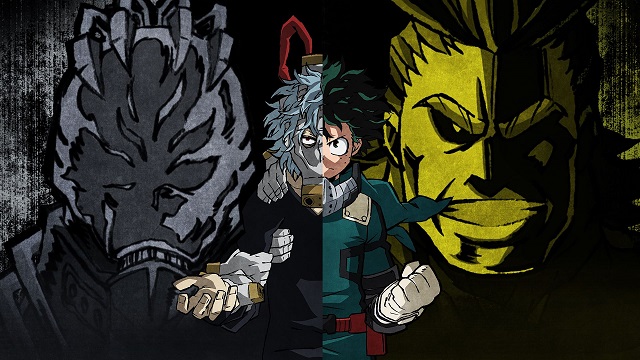





Published: Oct 31, 2018 05:44 pm